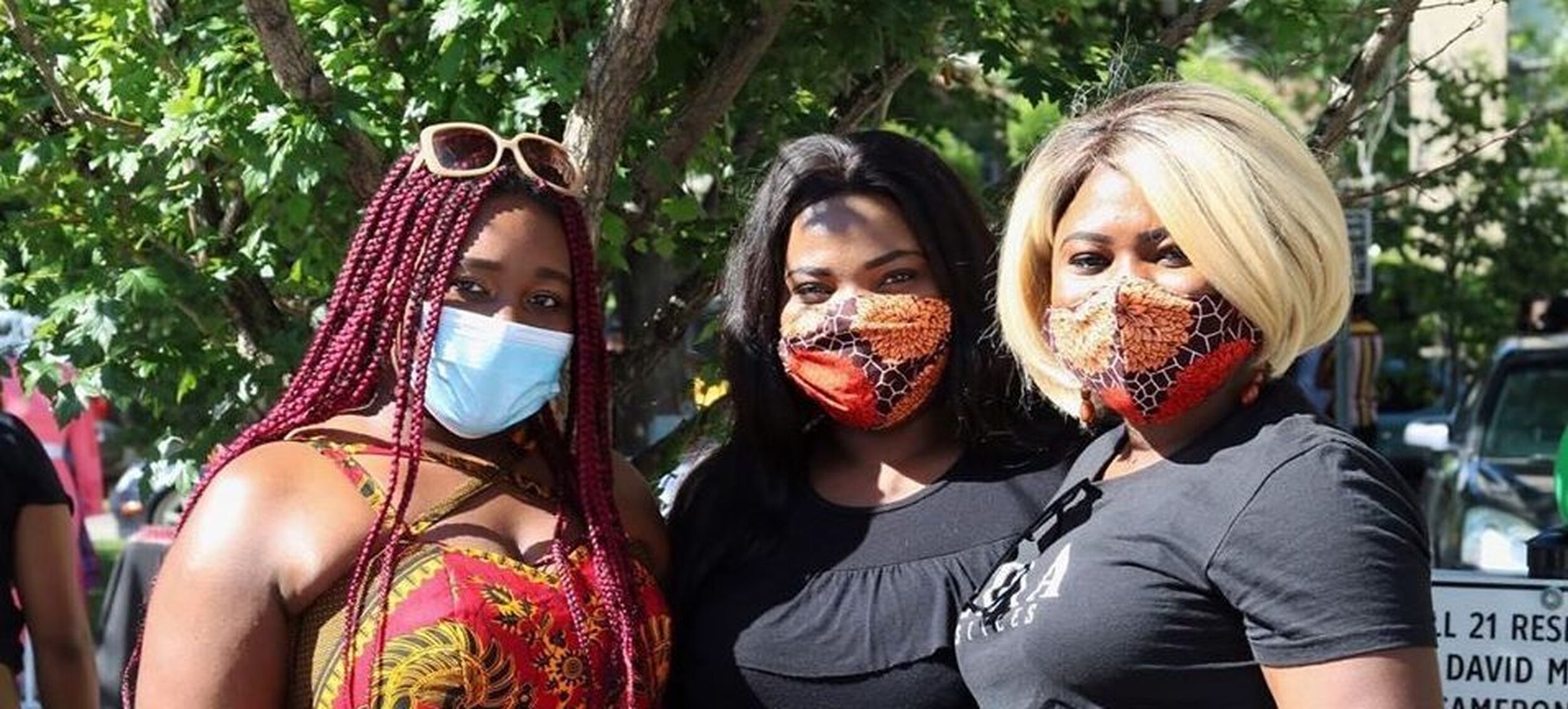
Attendees wear masks at the Black Owned Market in Calgary, July 18. Photo: Ife King
Calgary’s mask bylaw isn’t only about individuals
In a society, we need to consider the health of the collective.
On August 1, Calgarians will be temporarily required to wear face masks or coverings in public indoor spaces such as shopping malls, grocery stores and public transit.
But there are a number of exceptions to the enforceable bylaw. For instance, those who are unable to place or remove the face covering on their own, or those who have a medical condition or suffer with a disability that would be worsened by the wearing of the face covering are exempted from wearing a mask.
This bylaw does not require the individual to provide proof of reason for exceptions—like a doctor’s note—and businesses are not expected to enforce it. The bylaw is a means to further normalize wearing face coverings rather than being punitive over not wearing them.
Still, with a bylaw that seems to serve much more as a guide than as a prescription, the debate over face coverings continues, and some groups oppose this measure on grounds that it’s an infringement on individual freedom.
In coming together as a society, we become more than a group of individuals… We become a collective, a people.
Despite the vast empirical evidence—and advice from health experts—on the effectiveness of face coverings to prevent the spread of COVID-19, there are some who, based on unsubstantiated claims, argue that face coverings are harmful.
With many Canadian cities and provinces debating making masks mandatory, the group March to Unmask emerged.
On their Facebook page, March to Unmask Calgary states that while they are not anti-mask, they “fully respect every individuals [sic] right to make there [sic] own choice in deciding whats [sic] best for their health in regards to mask wearing.” They suggest that the move to make face covering mandatory is a “highly unnecessary and unethical violation of… fundamental rights.”
Medical evidence notwithstanding, let’s focus on the argument around individual freedom, and what it means when living in a society.
The myth of absolute individual freedom
Since the advent of modern society, humans have grappled with what it means to live in a society. What does society owe us and what do we owe society?
The fact is that, in coming together as a society, we become more than a group of individuals who gather together. We become a collective, a people.
In a society we are obligated to consider the health of each other as a collective.
This is not to say that our individual rights disappear, it is to say that the collective must be a consideration. The survival of the collective is dependent on the survival of the individuals. And the survival of individuals is dependent on the survival of the collective.
Essentially, society is a contract in which—realizing our mutual interdependence—we agree to give up certain personal freedoms for the survival of each other, for the survival of the collective.
The idea of every individual’s right to make their own choice has never been the basis for the formation of survival of a society. Very few of us could survive on our own, and it is a myth to think that individuals were completely independent in traditional communities.
An analogy can help us unpack the idea of individual choice. Consider someone who has an injury on one side of their body, making right shoulder checks problematic. Would that person have the right to make the choice to drive on the left side of the road because it is best for their health? The short answer is no.
We’re stronger together
In a society the whole is committed to the good of each and every individual, and the individual is committed to the good of the whole. With this understanding, individual rights take on a very different tone than a right to only consider what is good for one’s own health.
In a society we are obligated to consider the health of each other. The fact that others must also consider your health means that we gain a much greater freedom by living in a collective than we would on our own.
The choice of whether or not to wear a mask is more than an individual right.
“Man is [human beings are] born free, and he is [they are] everywhere in chains,” Jean-Jacques Rousseau wrote in The Social Contract.
While on our own we are solely responsible for ourselves, in a collective abiding by the social contract there is the security in knowing that our neighbour considers our wellbeing in addition to considering their own—if not for our own individual good, at least for theirs and for our collective good.
The choice of whether or not to wear a mask is more than an individual right.
In a society where our individual rights have always been considered in light of the collective, wearing a mask is one more thing we can do as responsible citizens to show that we are truly in this together.
Monetta Bailey, PhD. is a Barbadian-Canadian who has called Alberta home for the last 30 years. She is currently an associate professor at Ambrose University where she teaches sociology with a focus on criminology and critical race theory.
Now more than ever, we need strong independent journalism in Alberta. That's what The Sprawl is here for! When you become a Sprawl member, it means our writers, cartoonists and photographers can do more of the journalism we need right now. Become a Sprawl member today!
Support independent Calgary journalism!
Sign Me Up!The Sprawl connects Calgarians with their city through in-depth, curiosity-driven journalism. But we can't do it alone. If you value our work, support The Sprawl so we can keep digging into municipal issues in Calgary!




